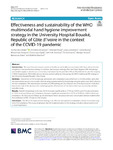2022-02-17Zeitschriftenartikel
Effectiveness and sustainability of the WHO multimodal hand hygiene improvement strategy in the University Hospital Bouaké, Republic of Côte d'Ivoire in the context of the COVID-19 pandemic
Müller, Sophie Alice
N’Guessan, Micheline
Wood, Rebekah
Landsmann, Lena
Rocha, Carlos
Kouame, Bléoué Jean
Djadji, Dominique
Abrokwa, Seth Kof
Eckmanns, Tim
Arvand, Mardjan
Diané, Bamourou
Borchert, Matthias
Introduction:
The most frequent adverse events in healthcare are healthcare-associated infections, whose burden is highest in resource-limited settings. In addition, low resource settings often lack Hand Hygiene (HH) knowledge and reliable supply to disinfectant, a necessity emphasized by the past West African Ebola Epidemic and the ongoing COVID-19 pandemic. PASQUALE aims to increase patient safety by introducing the WHO multimodal HH strategy in the University Hospital Bouaké, Côte d’Ivoire.
Methods:
Assessment of HH knowledge, perception and compliance was performed 12 months before, right after the intervention and at a ten months interval using questionnaires for knowledge and perception and direct observation for compliance. The intervention consisted of a HH training and the introduction of local production of alcohol-based hand-rub. In the absence of a control group, the effectiveness of the intervention was assessed by a before-and-after study.
Results:
Baseline knowledge score was 14/25, increased significantly to 17/25 (p < 0.001) upon first and decreased to 13/25 in second follow-up. Compliance showed a significant increase from 12.7% to 36.8% (p < 0.001) in first and remained at 36.4% in second follow-up. Alcohol-based hand-rub production and consumption almost doubled after first confirmed COVID-19 case in Côte d’Ivoire.
Conclusion:
The WHO HH improvement strategy is an effective and pandemic-adaptable method to increase long-term HH compliance. This study emphasizes that the implementation of the strategy to build a robust system is of utmost importance.
Files in this item

